
23 minute read
Voices for EuroNatur
EuroNatur, I‘m with you!
EuroNatur‘s supporters are the foundation’s backbone. Among them are Ildikó Kiss, Jürgen Fath, Liridon Hoxha and the Schaads, and they all say “EuroNatur, I’m with you!”.
Advertisement
Jürgen Fath has been supporting EuroNatur with donations for more than 25 years. He is delighted that, at long last, the Ulcinj Salina was designated a nature park. He has already visited the bird paradise together with his wife Ildikó Kiss.

It was a very positive experience to meet the fellow EuroNatur campaigners in Montenegro. It is obvious just how passionate they are about the issue, despite the personal risks they face when carrying out their conservation work. When I met the people behind EuroNatur, it has brought me a good bit closer to the
organisation at an emotional level. I do not think that the risks or threats to Europe’s nature will ease but I firmly believe that we will succeed. Jürgen Fath “
Dear EuroNatur team: Keep it up!
The European Green Belt is an amazingly good project
Liridon Hoxha was born in Freiberg but his family’s roots are in Kosovo. As an intermediary between the two worlds, the biologist is dedicated to establishing an environmental centre and research facility in the foothills of the Šar Mountains.
If no one invests in the protection of the landscapes along the Green Belt they will soon look just like the rest of Europe: built-up, covered in concrete, and with its forests lost to logging. However, when people come together in cross-border initiatives such as the European Green Belt project, an incredible energy is unleashed. This is not just about “ nature conservation but ultimately it is also about preserving peace. Those who look at Europe as a whole can see right away that it’s worth it to invest in EuroNatur’s work. Liridon Hoxha
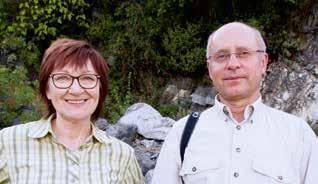
Karin and Gerhard Schaad love nature and like to actively contribute to nature conservation efforts. They have already been supporting EuroNatur with regular donations since the 1990s and have also named the foundation as a beneficiary in their will.
I think it is wonderful to see how EuroNatur takes great care to ensure that the local people in the
project regions can make a living in a way that is compatible with nature. There is also a very compelling level of transparency in the organisation. EuroNatur is a bit like a big family. Karin Schaad “
I feel the same way. Their presentation of how donations are used is clear and compelling and
their donor liaison is superb. There is a palpable sense of commitment among the staff right up to the management level. Gerhard Schaad “
We have great confidence in EuroNatur’s economic management
campaigns : For forests SAvEPARaDISEFORESTS „ We are losing extremely valuable natural treasures, and by ‘we’ I mean
not only Romania but the EU as a whole. If we do not succeed in
Europe to put an end to this tragedy most of the last of our Paradise forests will be lost – forever. Gabriel Păun, President of Agent Green “
Geographical location in Europe
Romanian Carpathian Mountains (Map p. 7, No. 6). These mountains host the
European Union‘s last sizeable primary forests outside of Scandinavia. Focal areas of the campaign include primary and old-growth forests in national parks and nature parks, areas of the European Natura 2000 system of protected areas and precious forests that are as yet unprotected.
Status Romania hosts the largest natural untouched forest heritage within the EU‘s temperate climate zone. The old-growth and primary forests of the Romanian Carpathians taken together occupy an area the size of the Black Forest (where there are no longer any comparable forests however) and host many strictly protected species. Moreover, these ecosystems store enormous quantities of carbon and significantly contribute to climate protection. The Romanian government does not however engage in genuine efforts to protect the valuable Carpathians forests. In recent years, 20 million cubic meters of timber were illegally logged in the Carpathians every year. The timber is exported and sold to large timber plants in Romania. In order to halt this overexploitation, EuroNatur together with the Romanian nature conservation organization Agent Green started the “SaveParadiseForests” campaign.
Objectives Our aim is to protect the precious forests of the Romanian Carpathians for current and future generations by means of generating awareness at the national and international levels of the risk facing the Romanian old-growth forests and by pushing for improved provisions for their protection. Timber companies should make a commitment to refrain from using timber from primary and old-growth forests. With our campaigns we aim to create positive change by means of exerting public and political pressure. Together with our partners we expose undesirable developments and abuses, inform and mobilize the public as well as EU committees, organize protests and, where appropriate, take legal action.
Is there hope for the Romanian primary forests? Yes! Thanks to our campaign the tragedy unfolding around logging in the Romanian Carpathian forests has become a European issue. The Romanian government has increasingly come under pressure at a number of different levels: Civil society no longer tolerates the exploitation of their resources and takes to the streets to defend the forests; several proceedings against illegal logging are underway at the national level; as a result of the first comprehensive inventory of the Romanian Carpathians forests and our EU complaint, the EU Commission and the EU Parliament have never been under greater pressure to take action against the irregularities in Romania.
Information, photos and videos on the „ SaveParadiseForests“ campaign can be found at www.saveparadiseforests.eu
Selected activities in 2019 In the Romanian Carpathians, the forests of outstanding importance for biodiversity and climate protection were identified. For the first time, the PRIMOFARO study (PRIMary and Old-growth Forest Areas of ROmania) commissioned by EuroNatur provides hard data on the extent of primary and old-growth forests still in existence in Romania. It found that these cover more than half a million hectares. At the same time the study documents the enormous extent of logging: Over the past 15 years, 100,000 ha of primary forest were destroyed – primarily in Natura 2000 sites and national parks where nature should in fact be protected. In September 2019, together with Agent Green and the internationally active lawyers of ClientEarth, we submitted a complaint to the European Commission. We provided evidence of the fact that the Romanian forest management company “Romsilva” engages in clearfell logging in protected Natura 2000 sites without conducting appropriate assessments of the resultant impacts, as prescribed by law. Agent Green held a number of peaceful protests with a view to mobilising Romanian civil society to rise up against the overexploitation of forests in the Carpathians. As part of the “March for the Forests” almost 5,000 people marched through Bucharest in November 2019 and called for the systematic detection of and a halt to illegal logging. With our help, our Romanian partners have already been able to initiate and proceed with more than 40 legal proceedings against illegal logging. In this manner we have already been able to get a number of logging concessions annulled.
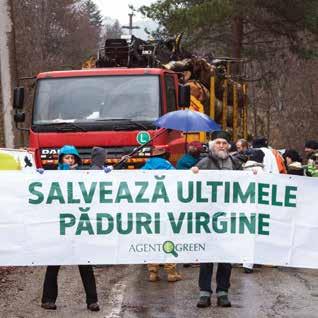
Important achievements in 2019 The PRIMOFARO study has provided us with new leverage to demand strict protection for the Romanian primary and oldgrowth forests at the national and European levels. With our complaint to the EU we have initiated infringement proceedings against Romania. The protests in defence of the forests have helped to strengthen civil society and establish a network of activists and volunteers in Romania. Agent Green secured an order to stop logging in some of the most valuable forest landscapes in the Domogled Cernei National Park.
Outlook We will continue to further mobilise the Romanian people to take peaceful action against the overexploitation in the Carpathians Mountains. Where possible and as necessary, together with our partners we will continue to take court action against illegal logging. In 2020, our focus at the international level is on two additional complaints to the EU.
Partners: Agent Green, ClientEarth
Funding: Aage V. Jensen Charity Foundation, Manfred-HermsenStiftung for Nature Conservation, Fondation pour la Sauvegarde de la Nature, Bristol Stiftung, Fair Future Stiftung, EuroNatur’s donors and sponsors
campaigns : For rivers Save the Blue Heart of Europe
Geographical location in Europe Ecologically valuable watercourses in the entire Mediterranean region and the Balkan Peninsula. A particular focus is on Europe’s last major untamed river: the Vjosa River in Albania (known as “Aoos” in Greece) including its catchment (Map p. 7, No. 5).
Status Especially in the wake of the discussions on climate change, hydropower tends to be wrongly touted as a “green” form of energy generation. This massively increases the pressure on the natural environment. It may spell the end of the last free-flowing rivers. These include streams and rivers in the Alps, the Pyrenees, Norway and southern France as well as in the Balkans. More than one third of the currently planned 8,785 hydropower plants are to be located in southern Europe.
Objectives Our aim is to protect Europe’s last free-flowing rivers and their ecosystems. At the national and international levels we aim to raise awareness of the destructive impacts of hydropower plants on nature. Given that rivers and streams have already experienced a very advanced level of destruction, the hydropower expansion must largely be halted. For the Balkan Peninsula, we have set out no-go areas for hydropower plants as part of an Eco-Masterplan. These no-go areas were based on the following criteria: naturalness, species diversity and the riverine landscapes’ protective status. We are trying to achieve that international financial institutions enter into commitments to refrain from funding hydropower projects in these areas and support the use of alternative energy sources instead, such as solar energy. We are also pressing for the Vjosa River to be designated a national park – all the way from its source to its estuary.
The Blue Heart of Europe beats in the Balkans Between Slovenia in the north and Greece in the south there are still intact rivers and riverine landscapes that are unparalleled in Europe. They are hotspots of biodiversity and constitute a unique natural heritage. More than 3,000 hydropower plants are planned for the Balkans or are already under construction – often without a credible Environmental Impact Assessment. Even if only a fraction of these were to become operational it would spell an ecological catastrophe, especially given the fact that many of the installations are planned in protected areas. The main providers of finance include the European Bank for Reconstruction and Development (EBRD), the European Investment Bank (EIB) and the World Bank as well as numerous commercial banks. In 2013, EuroNatur and Riverwatch in cooperation with local partners therefore initiated the “Save the Blue Heart of Europe” campaign.

For information, photos and videos please refer to www.balkanrivers.net
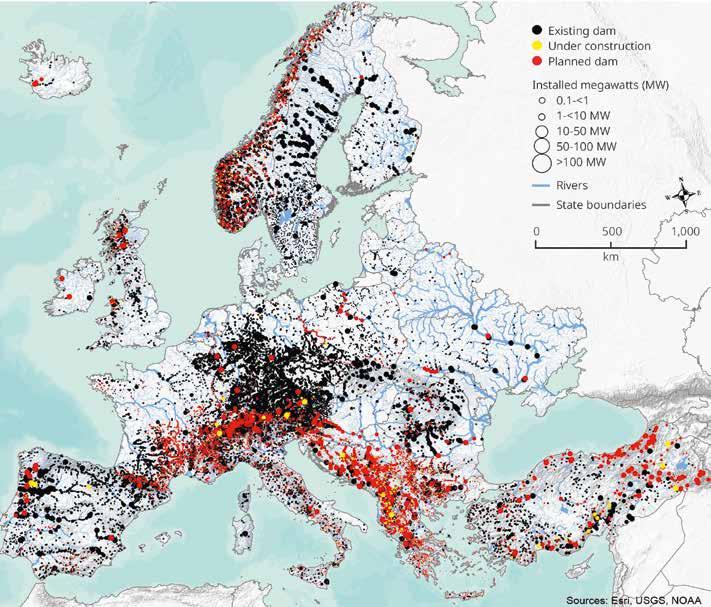
Inventory of existing hydropower dams, dams under construction, and planned dams in Europe. Most of the planned hydropower plants are concentrated in southern Europe (red dots). Many of Europe’s rivers are already chock-a-block with hydropower plants (black dots).
campaigns : For rivers Save the Blue Heart of Europe
Selected activities and achievements in 2019
No money, no dams
The EBRD organized a banking summit at which the financing of hydropower projects in the Balkans was critically scrutinised. Some of the biggest European providers of loans were represented, including UniCredit and Erste Group. On foot of the summit, the EBRD revised its investment guidelines for the rivers’ benefit. This process had been triggered by the delivery to the EBRD of the “No Money. No Dams.” online petition we had launched together with Patagonia in 2018 and which had been signed by 120,000 people.
Citizens mobilised to support the rivers
In 2019, more than 375,000 people followed the call issued by numerous conservation and environmental associations, including EuroNatur, to urge the European Commission to maintain the European Water Framework Directive (WFD). This action was met with success: the WFD, which also covers the protection of rivers, will be left intact. Thousands of people in the Balkans would lose their arable land, their drinking water supplies and a significant part of their native home as a result of hydropower projects. In order to give those affected a voice, we initiated and supported protest weeks in the Balkans in July 2019. In Serbia together we were able to bring the local resistance against hydropower to national and supra-regional attention: In late 2019 all opposition parties as well as the Serbian Environment Ministry advocated against mini hydropower plants. In light of the local resistance not a single hydropower plant was constructed in the Stara Planina Nature Park (Map p. 7, No. 11). At the Wild Rivers Science Symposium in Tirana approximately 120 renowned scientists from Europe, the United States and Japan called on the political decision-makers in southern Europe to protect the last intact rivers in Europe. An explainer video on our Eco-Masterplan for the Balkans reached a viewership of more than 90,000 people. At an event in the European Parliament, we significantly raised awareness for the Balkan rivers’ conservation needs. „ A river’s value cannot be measured in megawatts. Ulrich Eichelmann, CEO Riverwatch “
Where are we now?
There is now an extensive network of allies who are fighting to protect the freeflowing Balkan rivers, at the national and EU levels and even globally. The affected communities have increasingly been voicing their discontent in the streets and are beginning to defend their rivers from destruction. Hydropower is no longer uncritically accepted as being a “green” source of energy and the pressure on officials is growing. Scientists are raising their voices against the destruction of the rivers, and we have also been able to initiate a rethink in the EU institutions as well as with important financiers of hydropower projects. Our partners are fighting selected hydropower projects with a powerful team of national and international legal experts. By means of numerous studies, we have developed an excellent knowledge and database that provides us with solid arguments. To date we have been able to prevent the construction of a number of hydropower plants in particularly sensitive areas of the Balkan Peninsula and in the Mediterranean region. The unstable political situation in the Balkans does however pose a particular challenge. It is therefore all the more important to support the local civil society in its work to protect the rivers and to ensure that it has international backing.
Legal steps initiated
As part of the “Lawyers for Rivers” initiative, legal experts have been supporting local communities since 2019 in selected areas of the Mediterranean region and the Balkans in their efforts to take legal steps against hydropower projects. Several projects have already been shelved or had their planning permissions rescinded. In February 2019, we lodged a complaint against the Albanian government with the Energy Community. Albania is one of the contracting parties to this international organisation, the aim of which is to extend the EU internal energy market to Southeast Europe and the Black Sea region. The complaint concerns the approval procedures for the Kalivaç and Poçem hydropower projects on the Vjosa River which contravene the Energy Community’s rules. Our aim is to achieve that the Energy Community initiates infringement procedures against Albania. The Energy Community has already announced that it will open an “Albanian case”.


Reasoning for protection of rivers further strengthened
Together with other non-governmental organisations we published an overview of all planned hydropower plants in Europe (Figure p. 27). It is the first inventory of its kind and it shows the massive threats faced by the last undeveloped riverine landscapes. The study attracted great media attention. We presented our vision for a Vjosa National Park to representatives of the Albanian Ministry of Environment and to the National Agency for Protected Areas. The village Kutë on the Vjosa is fit to become Albania’s first solar village, as we have shown in a feasibility study. Kutë would be hugely impacted by the construction of the Poçem hydropower plant. Our aim is to present alternatives to the river’s destruction to the government officials in charge.

Outlook We will continue to pursue the campaign to protect Europe’s rivers with great intensity. A study on the hydropower projects’ socio-economic impacts is to show just how many people would be affected. In order to highlight alternatives to hydropower, we will help to make Kutë the first Albanian village to be self-sufficient in energy. We will also analyse the solar potential of roofs in Tirana. Together with our partners and legal experts we will at the same time vehemently fight the system of subsidies for hydropower as well as selected hydropower projects.
Partners: Riverwatch, Front 21/42, CZZS, EcoAlbania, Tour du Valat, MedINA, Pindos Perivallontiki, IUCN ECARO, WI European Association, WWF Adria, GEOTA
Funding: MAVA Foundation, Manfred-Hermsen-Stiftung for Nature Conservation and Environmental Protection, Fondation Genevoise de Bienfaisance, Fondation pour la Sauvegarde de la Nature, Patagonia, EuroNatur’s donors
campaigns : For the birds # SaveSalina
Geographical location in Europe The Ulcinj Salina (Map p. 7, No. 3) is an area of salt evaporation ponds covering almost 1,500 ha in the south of Montenegro near the border to Albania.
Status Thousands of birds depend on the Ulcinj Salina as a breeding, overwintering and resting site. However, in 2005 the saltworks were privatised under questionable circumstances and appear to have deliberately been run down with a view to developing the site for mass tourism. Salt production ceased in 2013, the salina has been falling into disrepair and salt loving bird species have increasingly disappeared. Together with our partners we are committed to saving this paradise for birds.
Objectives Our aim is to ensure that the Ulcinj Salina’s outstanding ecological diversity is recognised both nationally and internationally, and that it is afforded effective protection. We also want to ensure that salt production resumes and that the local communities utilise the potential for ecologically compatible sources of income around the Ulcinj Salina and thus contribute to the protection of flamingos, black-winged stilts and all the other bird species. We are given encouragement by the fact that 100,000 people support our initiative to save the Ulcinj Salina and believe in our goal. Marija Šoškic, ornithologist at CZIP “
Public pressure is effective!
In 2017, EuroNatur and its local partners initiated the #SaveSalina campaign. As a result, the Ulcinj Salina has gained recognition well beyond Montenegro’s borders. Thousands of people said “Stop!” to the salina’s development for mass tourism. Both the EU Commission and the EU Parliament are consistently pushing for the bird paradise to be afforded protection. The Montenegrin government had ignored this public pressure for years, but things took a delightful turn in 2019.
More information, photos and videos about the #SaveSalina campaign at www.euronatur.org/ulcinj-en
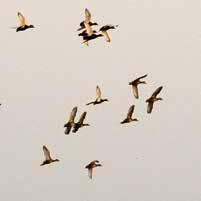
Selected activities in 2019 Attention was once again drawn to the issue with the 5th International Conference on the protection of Ulcinj Salina. The conference was attended by more than 100 representatives of the policy arena, nature conservation and the media. In the run-up to the conference we attracted a great deal of media attention when we presented a petition to Montenegro’s prime minister. The petition, which had been signed by 110,000 people, highlighted the salina’s International significance and called for its protection. Together with our partner organisations and the local communities we developed business ideas for gentle ecotourism around the Ulcinj Salina and selected projects worthy of support.
Important successes in 2019 In the summer of 2019, the Ulcinj Salina in Montenegro was given protection by way of its designation as a nature park. Moreover it enjoys international protection under the Ramsar Convention. This has finally put an end to the plans for the area’s development for mass tourism. The EU Commission has called on the Montenegrin government to also ensure the salina’s protection in practice and has made this one of the conditions of Montenegro’s potential future EU membership.
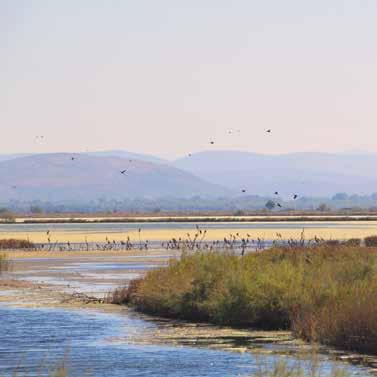
Particular challenges The provision of a protective designation is not sufficient by itself. Operation of the saltworks must recommence. However, until such time as the site’s ownership question has been resolved it will be impossible to find an investor for the salina. While the Montenegrin government has promised financial investment in the Ulcinj Salina, there is as yet no conservation management plan for the site.
Outlook The Ulcinj municipality appointed our partners at CZIP and MSJA to the working group for the development of a management plan. Together we are developing suitable restoration and conservation measures for the nature park. As soon as the ownership question has been resolved we will support the government in their endeavour to find an investor who will ensure the operation of the saltworks. A number of ecotourism projects will commence in 2020.
Partners: CZIP, MSJA, BirdLife International, Tour du Valat
Funding: MAVA Foundation, EuroNatur’s donors and sponsors
campaigns : # SaveSalina „ And then it slowly dawned on me: Ulcinj Salina is protected! An interview with Zenepa Lika & Jovana Janjuševi “ ć
It was a very special moment for Jovana Janjušević and Zenepa Lika when the Ulcinj municipality’s chairperson finally announced in June 2019 that “Ulcinj Salina will be declared a nature park”. The two Montenegrin EuroNatur partners had worked hard for years at the Center for Protection and Research of Birds of Montenegro (CZIP) and at the Dr. Martin Schneider-Jacoby Association (MSJA) to get to this point. This is their personal look back and ahead:

Can you describe the moment when you realized that the salina was finally designated as a nature park after these many years of struggle?
Zenepa Lika (MSJA): Although I conveyed the good news to everyone and posted it directly on Facebook, it took me a long time to realize that it was actually true. I felt like I was in some kind of void. It was only when I met our long-time fellow campaigner Darko Saveljic that it finally sank in: Ulcinj Salina is protected! I hugged him and we cried with relief.
Jovana Janjušević (CZIP): Having achieved the formal protection of the Ulcinj Salina was a bittersweet moment for all of us. It came after more than 15 years of advocating and campaign work. Especially the last five years have been very intense. But we have not only fought for the protection of the Ulcinj Salina on paper. Now investments have to be made and the nature park has to be managed; otherwise flamingos, pelicans and all the other bird species have no future here - regardless of the area’s protective status.


Why is international support still so important?
Lika: The trust that we have painstakingly built up among the people must not be lost. The municipality of Ulcinj, despite its problems, has done everything possible to ensure that the salina is protected. International support is particularly important now to ensure that people have faith that the salina can really be saved. Thanks to EuroNatur’s support, doors have often opened for us where otherwise we would not have been able to get in as much as a little toe.
Janjušević: Today, the Ulcinj Salina is known far beyond the borders of Montenegro. Among other things, Montenegro‘s EU accession process has proven to be an excellent mechanism to provide us national NGOs with compelling arguments for nature conservation. This gives us much more leverage. International attention is very helpful for us.

What kind of picture of Ulcinj Salina do you have in mind that encourages you to keep going?
Janjušević: Last summer I watched common terns raising their chicks in the saltworks on a floating artificial breeding platform. There they were safe from high water. New life can always encourage us to not give up.
Lika: I see workers in the fields harvesting salt, children who shriek with joy when they see flocks of flamingos in the salt ponds of the salina for the first time. I see people who come to visit and who are fascinated by Ulcinj Salina’s beauty. In short: I see life in the salt flats.
Interview: Katharina Grund
Media & public relations
Romania’s old-growth forests in print media, radio and television Our complaint to the EU has focused media attention on the logging of old-growth forests in Romania. Numerous national and international media outlets have picked up on the issue, including the “Tagesthemen”, one of Germany’s main daily television newscasts, and the German public broadcaster “Deutschlandfunk Nova”. Several leading German media outlets gave the issue detailed and critical coverage, for example the major German daily newspaper “Süddeutsche Zeitung” and the German national weekly newspaper “Die Zeit”. The international press also reported on our complaint to Brussels. „ This significant media response made some serious waves in Romania, with tens of thousands of people taking to the street to protest against the overexploitation of the Paradise Forests. There has been a massive increase in pressure on policymakers. Janinka Lutze, EuroNatur campaigner “
The myth of clean hydropower Hydropower is seen as “green” power, given that it is a regenerative source of energy. However, more and more media outlets now report on the catastrophic effects of hydropower dams on river systems. The “Save the Blue Heart of Europe” campaign is having an impact. home to some of Europe’s last free-flowing rivers.
ZDF heute, Germany, December 29, 2019, translated The hydropower plant by itself constitutes a massive ecological barrier for fish and other aquatic wildlife. […] “There is only a very small number of good fish ladders. Most of them don’t work.” says Gabriel Schwaderer of the EuroNatur Foundation.”
Neue Zürcher Zeitung, Switzerland, July 14, 2019, translated For now, the Vjosa river is flowing as it always has. Here, near the small village of Kutë, its riverbed spans several hundred metres. But Kutë’s treasure is at risk: Just a few kilometres downstream, at Pocem, a Turkish developer wants to construct a large dam. The reservoir that would be created by the dam would flood The Guardian, November 28, 2019 Europe’s last free-flowing rivers could be fatally disrupted if a new generation of hydroelectric dams are built, experts have warned. More than a quarter (28%) of new hydropower plants are to be constructed in nature reserves, with many planned in the Balkans,
the fields.

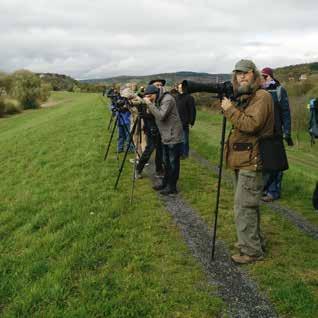
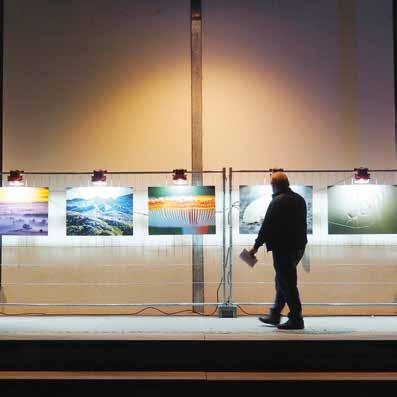
EuroNatur presents itself… EuroNatur Foundation presented its work in the public sphere as part of numerous events held in 2019. Here is a selection:
Nature Days (“Naturschutztage”) in Radolfzell, Germany (January 3-6, 2019) with a screening of the “Blue Heart” film.
Open air cinema night in the yard of the EuroNatur head office in Radolfzell (August 19, 2019) presenting a selection of documentaries on EuroNatur projects.
Radolfzell Culture Night (October 3, 2019) with an exhibition of the winning photographs of the EuroNatur photography contest entitled “Europe’s natural treasures”.
naturgucker (a project encouraging citizen science biodiversity recording) congress in Göttingen, Germany (November 1-3, 2019) with a presentation on the Ulcinj Salina.







